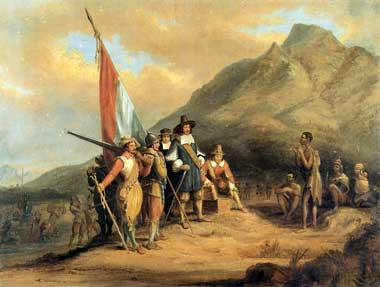
An imaginary scene depicting of the arrival of Jan van Riebeeck in Table Bay showing the land, its people and the environment that the Europeans so totally misread. The European settlers were not able to mange the South African environment within its limits because they misinterpreted the nature of African nature and it created a legacy that still endures. (Painting by Charles Bell, 1813-1882). Source: Wikipedia.
On 14 and 15 November 2013, the 44th symposium of the Australian Academy of the Humanities was held at the University of Queensland in Brisbane. This year the meeting focused on the burgeoning field of the environmental humanities and the symposium was entitled The question of nature. The first two sessions of the symposium were devoted to an important component of the environmental humanities: environmental history.
The symposium opened with a keynote address by leading environmental historian Jane Carruthers, Emeritus Professor at the University of South Africa. Her talk, entitled “The question of nature, or the nature of the question?”, explored the nature and purpose of environmental history in South Africa. In this episode of the Exploring Environmental History Podcast professor Carruthers argues that the European settlers were not able to manage South Africa’s environment within its limits because they misinterpreted the nature of African nature and it created a legacy that still endures. She explores why and how environmental history has an urgent role to play in addressing this legacy and should contribute to discussions about issues such as environmental and social resilience and sustainability as well as social justice. Jane Carruthers argues that environmental historians are well equipped to raise questions related to environmental and social issues particular to emerging countries such as South Africa.
Links and sites mentioned in the podcast
Jane Carruthers, “Environmental History For An Emerging World”, Conservation and Society (2013), Download from the journal’s website.
Programme 44th Symposium of the Australian Academy for the Humanities
Music credits
“Where You Are Now” by Zapac, available from ccMixter
“Lhasa” by Nic Bommarito, available from The Free Music Archive


Recent Comments